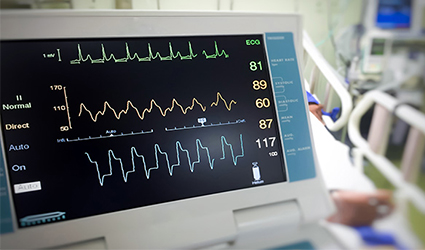Don’t Miss These Tips before Your Cardiac Monitor Purchase
September 5, 2018
Source: Ddu
 2,109
2,109

A cardiac monitor is a precision medical instrument, which can be used both in hospitals and at home. The heart is the engine of our bodies, it keeps pumping blood in and in to ensure the nutrients in the blood is delivered to the whole body.
The performance of our hearts is a significant index to mirror health conditions. A cardiac monitor can monitor a patient’s heart health in real-time by providing the physiological parameters of ECG patterns, which proves the necessity of cardiac monitor within the medical treatment. Other physiological parameters such as respiratory, body temperature, blood pressure, blood-oxygen saturation and pulse rate can also be detected by the cardiac monitor.
Cardiac monitors are used to execute EPS procedures, diagnostic tests as well as therapeutic procedures. The device can also analyze atrio-ventricular conductions via targeted stressors, determine the intervention and assess the sinus node function. Before purchasing and cardiac monitor consider the following tips:
1. A cardiac monitor should be equipped with amplifiers and filter for signal acquiring and processing. It should also be equipped with a display screen and a recorder. Pre-existing amplifiers can be used and be interfaced with a corresponding display screen and recorder.
2. Cardiac monitors may be tabletop, mobile or wall-mounted depending on what their required positioning should be.
3. The devices should be equipped with at least 12 surface electrocardiogram channels and 24 intra-cardiac electrocardiogram channels, as well as programmed lead switching allowing physicians to select the maximum channels depending on procedural requirements.
4. A console with high-resolution color monitors should be fitted to display waveforms and other relevant data on an integrated computer system, which should be equipped with media recording and data processing software.
5. A cardiac monitor should have a chart recorder with printing functions, plug-in modules with vital signs and procedure monitoring functions as well as a remote amplifier unit to process and condition cardiac electrode signals.
6. A cardiac monitor should be able to print out the interpretation chart by referring to various reference lines. It should also be able to access the cardiac CAT lab imaging systems and radio frequency generating devices as well as use multitasking software with user-configurable parameters that allows real-time signal analysis.
7. These devices should have the capability to access to the NCD (National Cardiology Database) and the system of cardiology data management.
As the importance of electro-cardiac monitors is notable, the demand in the medical market is predicted to continuously growing. Before making a purchase you need a professional guideline to ensure the quality of your intended buy. This is where our team at Ddu, a global cross-border medical trade B2B e-commerce platform, can assist you in realizing your goals.
Click here for more information about the hang-picked online cardiac monitor rallies and ECG monitor.
By DduRead more on
- Disposable Medical Products that Keep Your Medical Facility Clean and Sterile March 31, 2022
- 10 Triumphant Drug Launches Of The Decade August 26, 2021
- Ultrasonic Nebulizer Market Views September 6, 2018
- 4 Best-Selling Digital Thermometers on Drugdu.com in 2018 September 5, 2018
- Chest Strap ECG Heart Rate Monitor Portable Fitness Tracker August 31, 2018
your submission has already been received.
OK
Subscribe
Please enter a valid Email address!
Submit
The most relevant industry news & insight will be sent to you every two weeks.



